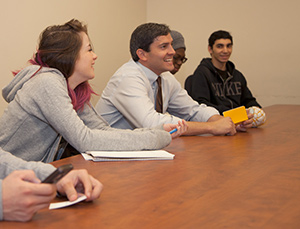Bunker Hill Community College Celebrates Veterans Day with Author Rye Barcott
Monday, November 10, 2014
Former U.S. Marine Rye Barcott visited Bunker Hill Community College on November 6 in honor of Veterans Day 2014. He met with students in the Learning Community Seminar Media Literacy in the 21st Century, enjoyed a lunch prepared by Culinary Arts students in the College dining room, stopped in at the Veterans Center, and signed copies of his book following a talk he delivered to an audience of faculty, staff, students and visitors.
 Drawing upon his experiences as both a U.S. Marine and the founder of the nongovernmental organization Carolina for Kibera, Barcott urged students to find ways to use their talents to create opportunities. He reminded them that by earning their degrees they will be “joining a global elite [because] only five percent of the world’s population holds a college degree.” He urged them to take risks in the service of others, to make one another better people, and to keep in mind that “everything that matters is difficult.”
Drawing upon his experiences as both a U.S. Marine and the founder of the nongovernmental organization Carolina for Kibera, Barcott urged students to find ways to use their talents to create opportunities. He reminded them that by earning their degrees they will be “joining a global elite [because] only five percent of the world’s population holds a college degree.” He urged them to take risks in the service of others, to make one another better people, and to keep in mind that “everything that matters is difficult.”
Barcott served as a Marine in Iraq, Bosnia and the horn of Africa. His book It Happened on the Way to War describes “fighting war, and waging peace.” The organization he established in the settlement of Kibera, Kenya, while serving in the military uses a unique model of participatory development to break cycles of violence and extreme poverty. Acclaimed by Archbishop Desmond Tutu as “tremendous,” the book was named one of the best non-fiction titles of the year by Reader’s Digest.
Media Contact:
About Bunker Hill Community College
With more than 50 years of academic excellence, Bunker Hill Community College (BHCC) is one of Massachusetts' largest community colleges, serving approximately 16,000 students annually. With campuses in Charlestown and Chelsea, BHCC offers a broad range of educational opportunities throughout Greater Boston. BHCC fosters a welcoming and supportive learning environment for students by offering associate degrees and certificates, early college and dual enrollment, community education, corporate training, and industry-specific programs.

